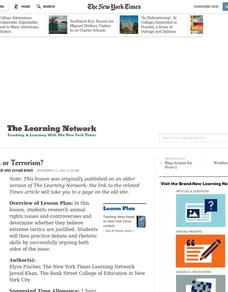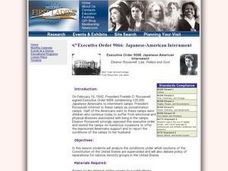Stanford University
Beyond Vietnam
On April 4, 1967 Martin Luther King, Jr. delivered his speech "Beyond Vietnam." The controversy that followed is the focus of a three-instructional activity unit that asks class members to consider the political and social implications...
Curated OER
America's Wars, 1898-1945
Students examine the wars the United States was involved in between 1898 and 1945. In groups, they determine the causes and effects of each war and how each war changed the way the United States handled their foreign affairs. As a class,...
Curated OER
Education Reform
Students identify problems and potential improvements for U.S. public school education. They research and debate the pros and cons of the "No Child Left Behind Act".
Curated OER
Genetically-Modified Food
Students investigate the pros and cons of genetic engineering. They watch a short Bill Moyers video, conduct Internet research, create a poster, participate in a pro/con debate, and write an essay expressing their personal feelings on...
Curated OER
Activism of Terrorism
Students research animal rights issues and controversies and determine whether they believe extreme tactics are justified. They practice debate and rhetoric skills by successfully arguing both sides of the issue.
Curated OER
A Delicate Balance
Students reflect on racial balance in their own schools, debate merits of policies that seek to create and maintain school racial diversity, and write essays on whether their school should promote racial balance.
Curated OER
The Panic of 1837 And the Presidency of Martin Van Buren
Students analyze period political cartoons as they study the causes of the Panic of 1837. They use primary sources to evaluate President VanBuren's response to the panic and public opinion of the results of his policies. Then they...
Curated OER
National Service: Lesson Plan
Students explore and take postions on the concept of mandatory community service. They then debate the issue in class as a learning model.
Curated OER
Recycling Lesson Plan
Students examine the role of choice in a democracy, the choice to participate and not to participate. They take a position on the role of recycling and whether in a democracy people can be forced to recycle. They break into for and...
Council for Economic Education
New Sense, Inc. vs. Fish 'Till U Drop or Coase Vs. Pigou
Who is responsible for protecting the environment, and who should pay when it is damaged? The role of government and private industry is complicated. A role-play simulation prompts individuals to decide how to protect a fictitious town...
Serendip
Should States Repeal Their Laws Banning First Cousin Marriage?
Around half of the states in the US ban first cousin marriage, but does science support that ban? Scholars work through genetic analysis of the risks to understand if more states should ban the practice—or if some should remove it. They...
Teaching Tolerance
Film Festival
Everybody's a critic—even your pupils! Using the included resources as a guide, screen films related to social justice and ask film enthusiasts to critique them. Publish the reviews for your school community or develop a film festival...
Curated OER
Drug Testing In Schools - Take A Stand
Students examine facts about drug testing in schools.
Curated OER
What's the Hold-Up?
Students explore the current plan by New York City Mayor Michael Bloomberg to retain underperforming third graders in public schools. They research and debate social promotion versus retention.
Curated OER
Affirmative Action
Students explore policies concerning affirmative action. After reading affirmative action handouts, students use the internet and other resources to research information about affirmative action laws, court cases, and arguments. They...
Curated OER
Indian Removal in the Age of Jackson
Students compare policies toward Native Americans that were pursued by President Jackson as well as evaluate the impact of assimilation, removal, and resettlement on Native Americans
National First Ladies' Library
Executive Order 9066: Japanese-American Internment
Students analyze conditions under which sections of United States Constitution are superceded, research history of Native Americans, African Americans, and Japanese Americans, and debate policy of reparations for various minority groups...
Curated OER
The Tet Offensive and the Vietnam War
Students comprehend how the United States became involved in what one historian called the quagmire. Students identify and analyze the importance of the Tet Offensive in turning American public opinion against the Vietnam War. Students...
Curated OER
What are the Economic Functions of Government?
Students examine the role of government in market economies. In this economics instructional activity, students analyze the 6 economic functions of government as they explore current newspaper stories and categorize them. Students debate...
Digital History
The New Nation
George Washington and the new nation of the United States of America faced many problems in their inaugural years. Use this worksheet as a straightforward approach to learning about the reasons the country was experiencing a lack of...
Curated OER
Michigan Supreme Court
Students read articles on a hot topic (controverial topic) and prepare for a discussion on the article. They engage in forming an opinion on an important public concern and defending their opinion/position with supporting data. They...
Curated OER
So, You Think You Understand Parliamentary Democracy ?
Tenth graders experience first hand the complexity of the political process. They analyze the relationship between party policies and the political spectrum and develop an understanding of how Canada's laws are debated and passed.
Curated OER
Government Lesson Plan: Lesson Plan 3
Students examine affirmative action policies. They analyze the positive/negative aspects of affirmative action. They study historical development and current status of principles, institutions, and processes of political systems.
Curated OER
Just Don't Do It!
Students examine a debate over teaching sex education in public schools. After reading an article, they discover how school officials are trying to inform their students but please a diverse audience. They answer discussion questions...

























